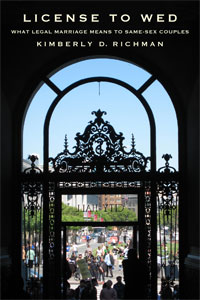 License to Wed: What Legal Marriage Means to Same-Sex Couples
License to Wed: What Legal Marriage Means to Same-Sex Couples
by Kimberly D. Richman
New York University Press. 271 pages, $39.
“License” can mean official permission to do something or the chance to go beyond normal constraints, and both meanings are implied in the title of License to Wed. The subtitle sums up what this book is about: the subjective experience of same-sex couples once they’re able to marry legally. It presents the research findings of Kimberly Richman, a professor of sociology and legal studies at the University of San Francisco. In exploring the quest for marriage equality, Richman sets out to answer two questions: what sets state-sanctioned marriage apart in people’s minds, and how does access to legal marriage affect same-sex couples?
This engaging work focuses on the impact of legal marriage on men and women in more than 1,500 same-sex marriages. Richman’s study shows convincingly that same-sex couples who were able to get married as they wished came to believe they were part of American society in a new and profound way. Her research included both paper-and-pencil surveys and interviews. The surveys were mailed in early 2005 to all 4,000 couples who had married in San Francisco in February and March of 2004, after Mayor Gavin Newsom authorized the city clerk to begin issuing marriage licenses to same-sex couples. By the time the surveys were fielded, the California Supreme Court had invalidated these marriages, but forty percent of the couples responded anyway. The second phase of research involved a hundred in-depth interviews, fifty with couples who married in San Francisco and fifty with couples who married in Massachusetts after legal marriages began there in May of 2004, following a Supreme Judicial Court order.
Although California seesawed on legal marriage and Massachusetts did not, responses were comparable in the two states. Couples from both states had similar profiles: stable, older professionals in long-term relationships; more than a third had children. Fifty-nine percent of the San Francisco couples and 55 percent of those in Massachusetts were female.
To deepen her findings, Richman applied the concept of “legal consciousness,” defined as “how people orient to, understand, and use the law.” This concept sees legality as a frame that affects how people think about social institutions. Looking at how the couples in her study saw their own legal marriages, Richman found three viewpoints she had anticipated: marriage seen as a way of securing rights, marriage as a form of political protest, and marriage as a means to personal validation. A fourth viewpoint took her by surprise: legal marriage as a demonstration of love and fidelity.
Although same-sex couples who married legally at the time of this study would not receive the same federal benefits as heterosexual married couples, many saw legal marriage as a route to security and equal treatment. “To me it really is about the rights,” said Scott, who had researched the legal and financial benefits of marriage before wedding his partner of twelve years in a small civil ceremony at Cambridge City Hall. “It’s not about the commitment, because we had that. It’s about being treated equally.” Even small-scale benefits, such as eligibility for discounts at a spouse’s workplace, mattered, because they added to couples’ feelings of official legitimacy.
Social legitimacy was another motivation. As Jeffrey put it following his marriage to Art in San Francisco, “I do know that when I had [the license]in my hand, I felt that was the most incredible feeling and validation … my parents have one and I needed one.” Similarly, when Garrett and Dean visited Garrett’s grandfather after their Massachusetts wedding, the old man handed them two newspaper clippings, one announcing his marriage to Garrett’s grandmother and the other announcing Garrett’s parents’ marriage. “For me, that was a recognition that he respected us as a couple.” Richman notes that many couples were “moved beyond their wildest expectations” regardless of their initial reasons for getting married.
Based on responses of these California and Massachusetts couples, the author concludes that “marriage or at least the ability to marry acts as a proxy for full citizenship.” Richman’s study is thorough and written in an unaffected, judicious style. Her analysis demonstrates that same-sex couples who are able to marry legally often find transcendent meaning in the experience. Given that most states prohibit same-sex couples from being legally married, License to Wed adds compelling personal reasons to the legal arguments for the validity of the struggle for marriage equality.
________________________________________________________
Rosemary Booth is a writer and photographer living in Cambridge, MA.





